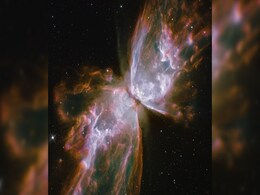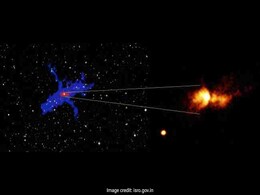Butterfly Nebula Wings
- All
- News
-

NASA Explains How Butterfly Nebula Originated And Got Its Wings
- Sunday January 15, 2023
- Science | Edited by Anjali Thakur
Most planetary nebulae are roughly circular, but a few have an hourglass or wing-like shape, like the aptly named 'Butterfly Nebula'.
-
 www.ndtv.com
www.ndtv.com
-

NASA Shares 'Sound' of Butterfly Nebula Created Through Data Sonification
- Wednesday November 17, 2021
- Edited by Gadgets 360 Newsdesk
The Butterfly Nebula, also known as NGC 6302, lies within our Milky Way galaxy between 2,500 and 3,800 light-years away, in the constellation Scorpius. It has two “wings” of gas heated to more than 36,000 degrees Fahrenheit (19,982 degrees Celsius).
-
 www.gadgets360.com
www.gadgets360.com
-

"Most Spectacular Object": ISRO Discovers "Wings" On Butterfly Nebula
- Thursday November 1, 2018
- Science | Edited by Revathi Hariharan
Indian astrophysicists were treated to what they called the "most spectacular objects in the sky" when they discovered ultraviolet wings around the Butterfly Nebula, captured using Ultraviolet Imaging Telescope (UVIT) of AstroSat. A nebula is an interstellar cloud of dust, and gases.
-
 www.ndtv.com
www.ndtv.com
-

NASA Explains How Butterfly Nebula Originated And Got Its Wings
- Sunday January 15, 2023
- Science | Edited by Anjali Thakur
Most planetary nebulae are roughly circular, but a few have an hourglass or wing-like shape, like the aptly named 'Butterfly Nebula'.
-
 www.ndtv.com
www.ndtv.com
-

NASA Shares 'Sound' of Butterfly Nebula Created Through Data Sonification
- Wednesday November 17, 2021
- Edited by Gadgets 360 Newsdesk
The Butterfly Nebula, also known as NGC 6302, lies within our Milky Way galaxy between 2,500 and 3,800 light-years away, in the constellation Scorpius. It has two “wings” of gas heated to more than 36,000 degrees Fahrenheit (19,982 degrees Celsius).
-
 www.gadgets360.com
www.gadgets360.com
-

"Most Spectacular Object": ISRO Discovers "Wings" On Butterfly Nebula
- Thursday November 1, 2018
- Science | Edited by Revathi Hariharan
Indian astrophysicists were treated to what they called the "most spectacular objects in the sky" when they discovered ultraviolet wings around the Butterfly Nebula, captured using Ultraviolet Imaging Telescope (UVIT) of AstroSat. A nebula is an interstellar cloud of dust, and gases.
-
 www.ndtv.com
www.ndtv.com




